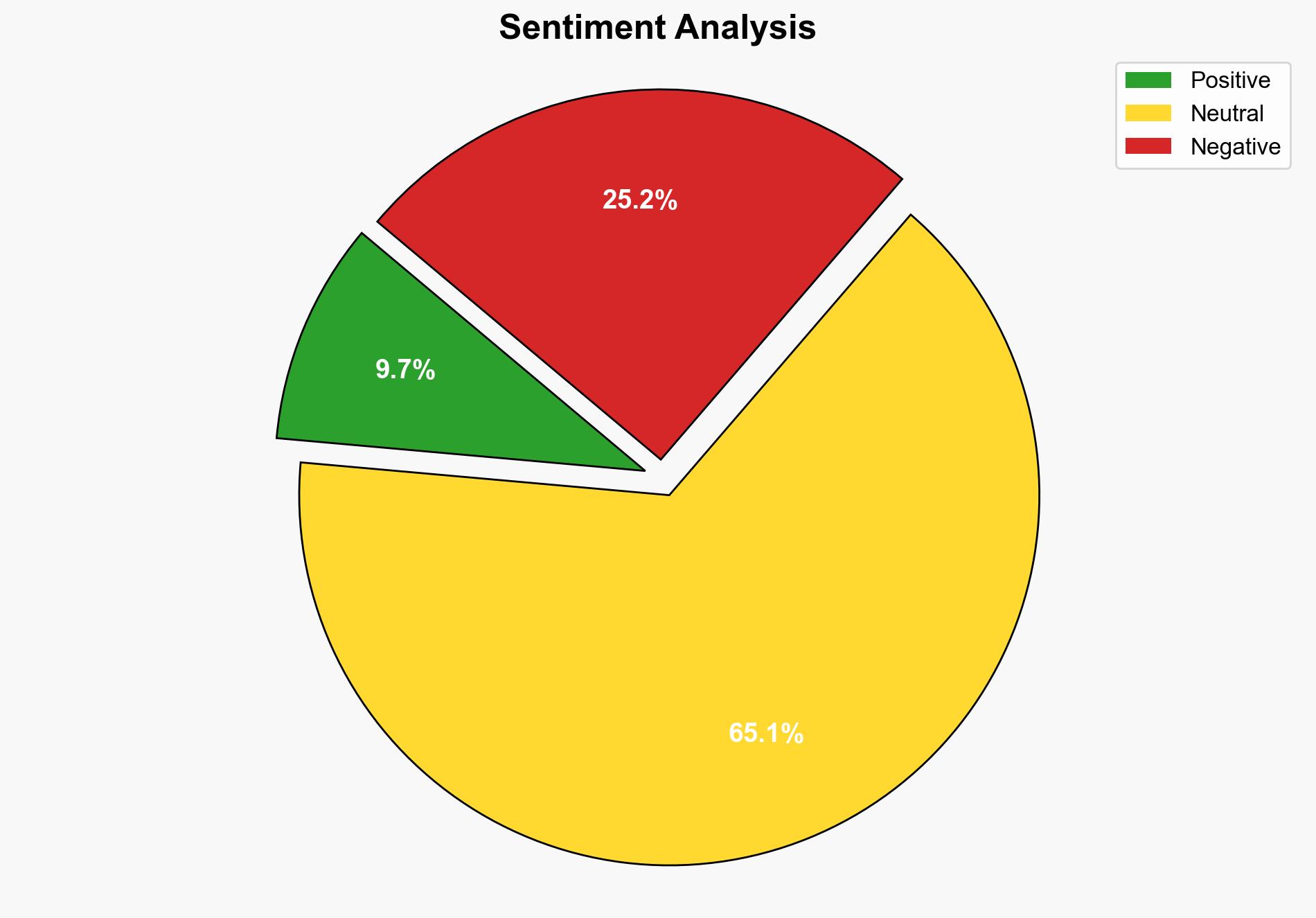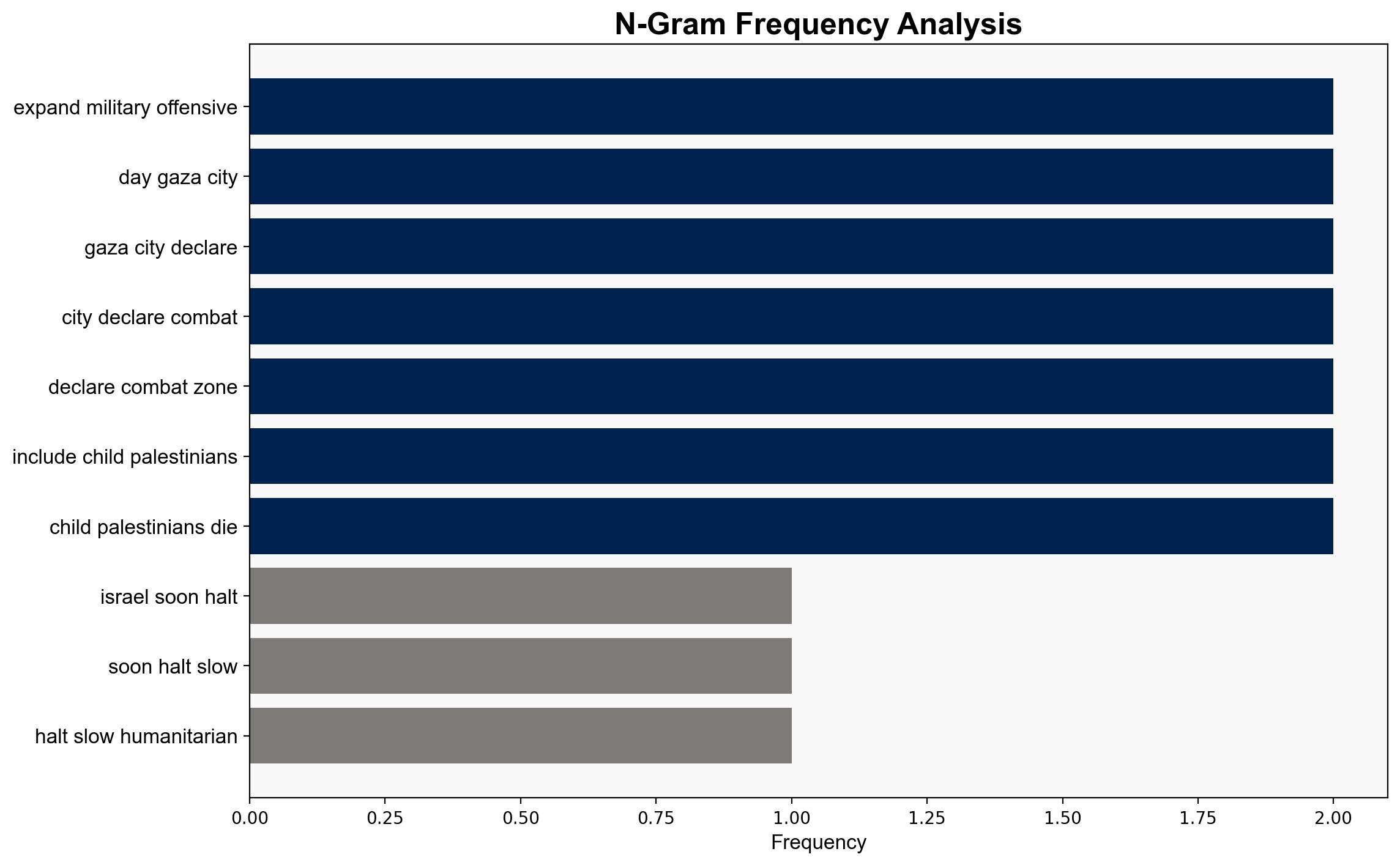Israel soon will halt or slow aid to northern Gaza as military offensive grows – Japan Today
Published on: 2025-08-30
Intelligence Report: Israel soon will halt or slow aid to northern Gaza as military offensive grows – Japan Today
1. BLUF (Bottom Line Up Front)
Israel’s decision to halt or slow aid to northern Gaza amid an expanding military offensive against Hamas is likely to exacerbate humanitarian conditions and international tensions. The most supported hypothesis is that Israel aims to intensify military pressure on Hamas, potentially at the cost of increased international condemnation. Confidence level: Moderate. Recommended action: Engage in diplomatic efforts to mediate humanitarian access while addressing security concerns.
2. Competing Hypotheses
1. **Hypothesis A**: Israel’s primary objective is to weaken Hamas by intensifying military operations, using the reduction of aid as leverage to force Hamas into a weakened position. This strategy aims to disrupt Hamas’s operational capabilities and infrastructure.
2. **Hypothesis B**: The reduction in aid is primarily a logistical necessity due to the intensification of military operations, with no direct strategic intent to leverage humanitarian conditions. The focus is on operational security and minimizing risks to Israeli forces.
Using the Analysis of Competing Hypotheses (ACH) 2.0, Hypothesis A is better supported due to the strategic pattern of using humanitarian conditions as leverage in conflict zones, historical precedence, and the timing of aid reduction coinciding with military escalation.
3. Key Assumptions and Red Flags
– **Assumptions**:
– Israel believes that reducing aid will pressure Hamas.
– Hamas’s operational capabilities are significantly affected by humanitarian conditions.
– **Red Flags**:
– Lack of transparent communication from Israeli officials regarding the aid reduction rationale.
– Potential underestimation of international backlash and humanitarian fallout.
– **Blind Spots**:
– Possible underreporting of internal dissent within Israel regarding the humanitarian impact.
– Limited visibility into Hamas’s adaptive strategies in response to aid reduction.
4. Implications and Strategic Risks
– **Humanitarian Impact**: Escalating humanitarian crisis could lead to increased international condemnation and pressure on Israel.
– **Geopolitical Tensions**: Strained relations with key allies advocating for humanitarian access could impact diplomatic ties.
– **Escalation Risks**: Intensified military operations may provoke broader regional instability or retaliatory actions from Hamas.
– **Psychological Impact**: Increased civilian suffering may fuel anti-Israel sentiment and radicalization within and beyond the region.
5. Recommendations and Outlook
- **Mitigation**: Facilitate third-party mediation to ensure humanitarian corridors remain open, balancing military objectives with humanitarian needs.
- **Exploitation**: Use diplomatic channels to communicate Israel’s security concerns and humanitarian efforts to mitigate international backlash.
- **Scenario Projections**:
– **Best Case**: Successful military objectives with minimal humanitarian impact and maintained international support.
– **Worst Case**: Severe humanitarian crisis leading to international isolation and increased regional instability.
– **Most Likely**: Continued military operations with periodic humanitarian pauses, resulting in sustained international criticism.
6. Key Individuals and Entities
– Benjamin Netanyahu: Prime Minister of Israel, central to strategic decisions.
– Mirjana Spoljaric: President of the International Committee of the Red Cross, highlighting humanitarian concerns.
– Zahiro Shahar: Relative of a hostage, representing public sentiment and pressure on the Israeli government.
7. Thematic Tags
national security threats, humanitarian crisis, geopolitical tensions, military strategy




